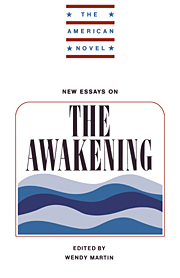Book contents
- Frontmatter
- Contents
- Series Editor's Preface
- 1 Introduction
- 2 Tradition and the Female Talent: The Awakening as a Solitary Book
- 3 Revolt Against Nature: The Problematic Modernism of The Awakening
- 4 The Half-Life of Edna Pontellier
- 5 Edna's Wisdom: A Transitional and Numinous Merging
- Notes on Contributors
- Selected Bibliography
5 - Edna's Wisdom: A Transitional and Numinous Merging
Published online by Cambridge University Press: 06 January 2010
- Frontmatter
- Contents
- Series Editor's Preface
- 1 Introduction
- 2 Tradition and the Female Talent: The Awakening as a Solitary Book
- 3 Revolt Against Nature: The Problematic Modernism of The Awakening
- 4 The Half-Life of Edna Pontellier
- 5 Edna's Wisdom: A Transitional and Numinous Merging
- Notes on Contributors
- Selected Bibliography
Summary
The human being who has a soul does not obey anyone but the universe,” wrote the French poet Gabriel Germain. Readers of Kate Chopin's The Awakening keep asking themselves whether the protagonist, Edna Pontellier, abandoning herself to the waters of the Gulf of Mexico at the end of the book, obeys the universe and therefore the needs of her soul; or whether, “idly, aimlessly, unthinking and unguided” – as she has lived for twenty-eight years – she simply lets herself be carried into the unknown “rapt in oblivious forgetfulness.” The question of whether Chopin intends Edna's disappearance to be regarded as a victory (the mythical apotheosis of her integrity, whatever its cost) or a defeat (the inevitable outcome of her hubris, whatever its motivation).
The ending is indeed ambiguous because it is “open” and technically “circular.” We do not actually “see” Edna drown but see her instead surrounded by and bathed in symbols of fertility and immortality (the sea, the sun, bees). To this extent, the ending is open. At the same time, it is technically circular because the narrative movement in the last chapter reverts to the very beginning of the book, which is set on the sensuous, promising Gulf of Mexico. The close thus presents an equivocal “solution.” There is the implied suicide, but Edna may have begun to live at another level of existence.
- Type
- Chapter
- Information
- New Essays on The Awakening , pp. 109 - 148Publisher: Cambridge University PressPrint publication year: 1988
- 5
- Cited by



